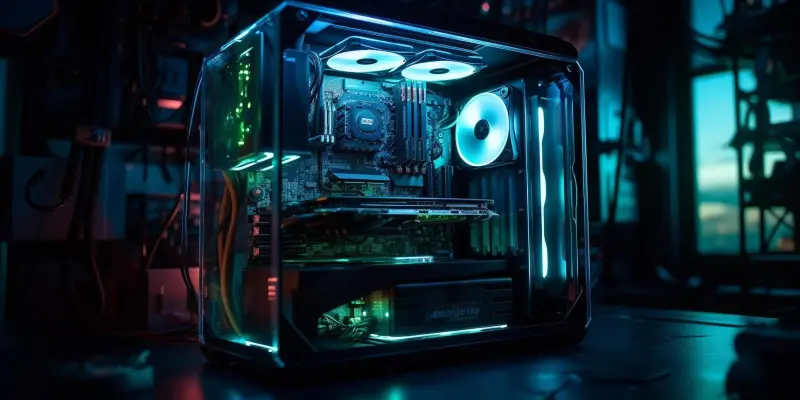Lian Li’s introduction of the LANCOOL 207 Refresh has stirred discussions in the tech community, marking a significant step in PC case design. This upgraded version of the LANCOOL 207 features an innovative 6-inch LCD panel integrated into its front panel, presenting a set of advanced functionalities. Sporting a resolution of 720×1600 pixels, a 60Hz refresh rate, and a maximum brightness of 500 nits, this LCD is not just an aesthetic addition but offers practical utilities as well. It can display essential hardware stats like GPU and CPU temperatures, host personalized content, and even serve as a secondary monitor through a USB connection. One striking feature is its ability to remain operational even when the system is off, displaying the date and time. The integration of such a display positions the LANCOOL 207 Refresh as a potential game-changer in PC case innovation.
Advanced Features and Design
In retaining its classic design, the LANCOOL 207 Refresh maintains a spacious interior that accommodates various high-performance components effortlessly. The offset motherboard mounting design provides enhanced GPU and cooler clearance, which is crucial for modern gaming and productivity setups. Additionally, a dedicated PSU shroud at the front helps in better cable management and improved airflow. This clever design decision is further supported by pre-installed fans located on the PSU shroud and front panel, ensuring effective cooling right out of the box. Moreover, the case is engineered to support the installation of a 360mm radiator on the top panel, which is ideal for gamers or creators aiming for optimal thermal performance. The inclusion of rear vents allows for an efficient exhaust system, contributing to the case’s overall airflow dynamics. What sets the LANCOOL 207 Refresh apart from its predecessors and competitors is the thoughtful combination of aesthetics and functionality. The LCD panel is not only a visual treat but also a practical tool, providing real-time monitoring and additional display capabilities. The spacious and versatile interior makes it adaptable for various hardware configurations, from high-end gaming rigs to powerful productivity machines. By merging these features, Lian Li has crafted a case that appeals to both enthusiasts and professionals, ensuring that it meets diverse user needs while pushing the boundaries of what a PC case can offer. The LANCOOL 207 Refresh is available in a sleek black finish and priced at $109.99, making it an accessible option for those seeking innovative design without breaking the bank. Pre-orders are open on popular sites such as Newegg, Overclockers UK, and Caseking, with shipping dates set for late April. This pricing strategy ensures that a broader audience, from budget-conscious gamers to professional creators, can experience the advanced features of the LANCOOL 207 Refresh. In a market where PC case options are abundant, Lian Li’s approach of integrating advanced technology with a user-friendly design sets a new standard in PC case innovation.
Looking ahead, the LANCOOL 207 Refresh has set a precedent for future PC case designs. Its combination of a usable LCD panel, excellent cooling capabilities, and thoughtful interior layout challenges other manufacturers to innovate further. The introduction of this case signifies an evolution in what users can expect from their PC enclosures. It’s not just a protective shell for components anymore; it is an integral part of the computing experience, providing valuable functionality and aesthetic appeal. In conclusion, the LANCOOL 207 Refresh by Lian Li introduces a new benchmark in PC case design. By merging practical innovations like the interactive LCD panel with a robust and flexible interior, this case offers an enticing package at a competitive price point. The industry will likely see more cases incorporating similar or even more advanced features in the coming years, thanks to the impetus provided by Lian Li’s latest offering. Future developments in PC case innovation will now have a new standard to measure up to, making the LANCOOL 207 Refresh an exciting development for both consumers and designers alike.

